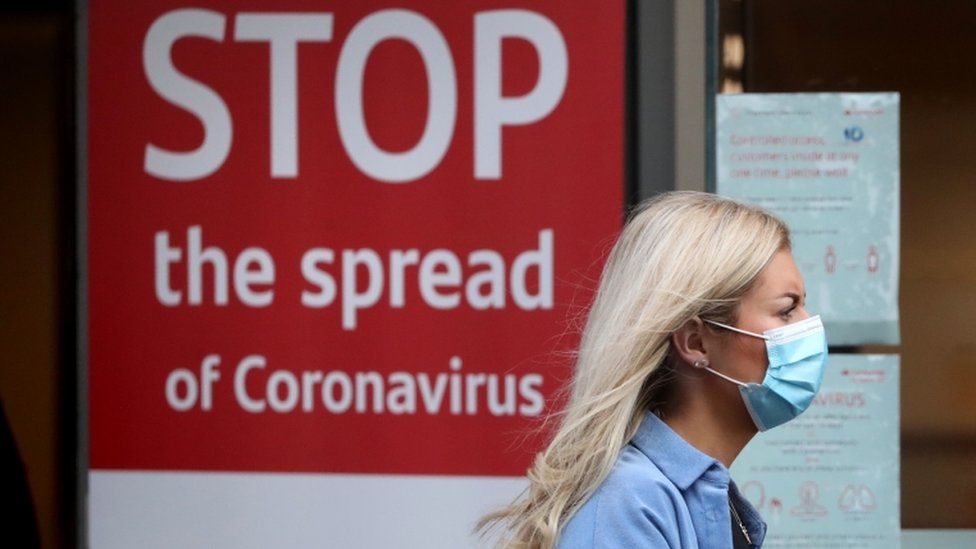The data provides more evidence lockdown is working, even with more infectious variants of the virus circulating.

image copyrightPA Media
Levels of coronavirus are going down in all four nations of the UK, latest figures from the Office for National Statistics (ONS) show.
The data provides more evidence that lockdown is working to control the virus, even with the more infectious variants circulating.
The latest R number, estimated to be between 0.7 and 0.9, also suggests infection numbers are shrinking.
This is the first time since July that R has been this low.
It means, on average, every 10 people infected pass it on to between 7 and 9 more.
Experts warn that infection levels remain high, however.
It is not clear yet when lockdown will begin to be lifted. Scientists advising government say the lower the cases can get, the better. Unlocking too soon risks another surge of the virus, even though more people are being vaccinated against the disease every day.
Prime Minister Boris Johnson has said he will outline plans for easing any restrictions in the week of 22 February.
Getting schools back will be the immediate priority, the government says.
The PM’s official spokesman did not rule out that one option being considered is social distancing being maintained until the autumn: “The latest data and evidence clearly shows that we remain in a difficult situation with the pressure on the NHS still very significant.
“We will set out a gradual and phased approach towards easing the restrictions in a sustainable way.”
The ONS figures, based on tests from people whether or not they had symptoms, suggest:
- One in 80 people in England has the virus
- In Northern Ireland, it is one in 75
- In Wales, it is one in 85
- In Scotland, it is one in 150
London continues to have the highest proportion of people likely to test positive for coronavirus in any region of England, with around one in 60 estimated to have had Covid-19 in the week up to 6 February.
The ONS’s data is slightly out of date – covering the week up to 6 February – so may not reflect the situation right now.
Senior Statistician Sarah Crofts said: “Rates of infection remain high but have continued to decrease in England and across the UK.
“The percentage of positive cases compatible with the new UK variant also continues to decrease in all regions of England except for Yorkshire and The Humber, the East Midlands and the South West where trends remain uncertain.”


The evidence is clear – lockdown is having the desired effect of controlling the virus, bringing the number of new infections down.
It is very welcome news, but does it mean we can now safely start to lift some restrictions? Not quite yet, say experts.
As one explained, it’s a bit like when a relative has been very ill in hospital and you hear that they are getting better – it’s wonderful, but it doesn’t mean that the ‘treatment’ can stop or that things can’t take a turn for the worse.
There is still plenty of the virus circulating that people could catch.
And although the vaccine rollout is going really well, there are lots of people in the UK who are not yet protected and who could fall serious ill with Covid-19 if they become infected.

Meanwhile, more than 13.5m UK people have had at least their first dose of a coronavirus vaccine.
The ambition is to offer a vaccine to around 15m people in the top four priority groups – which includes people over 70, health and social care workers and people who are extremely clinically vulnerable and shielding – by Monday 15 February.
Wales says it has already achieved this. England, Scotland and Northern Ireland are expected to announce the same soon.
The 13.5m figure includes some people outside of these initial groups.
Some regions of the UK have begun inviting groups planned to be reached later in the month, such as the over-60s and people aged 16-64 with underlying health conditions.

